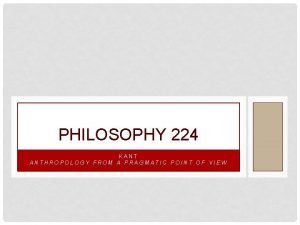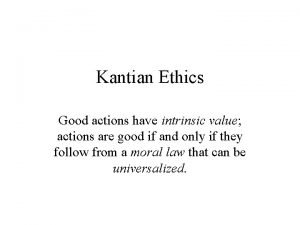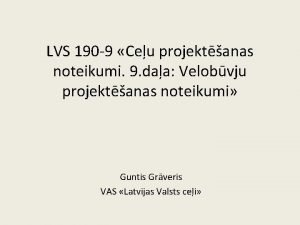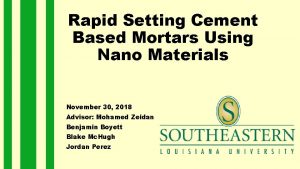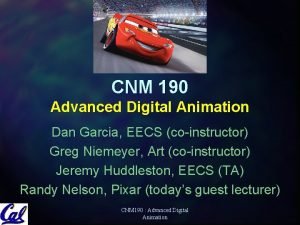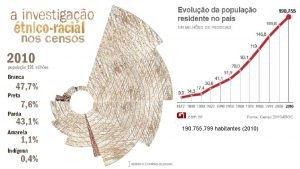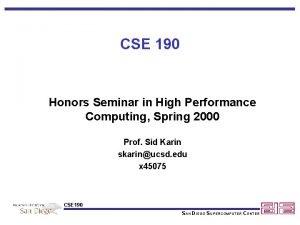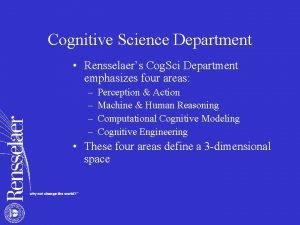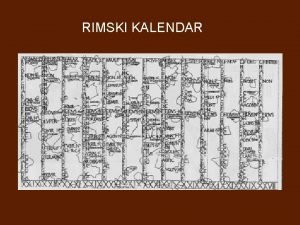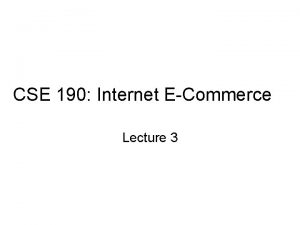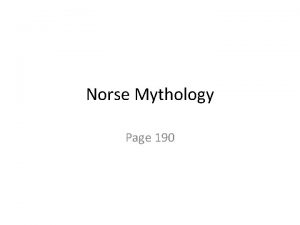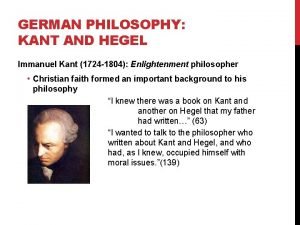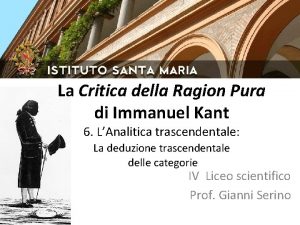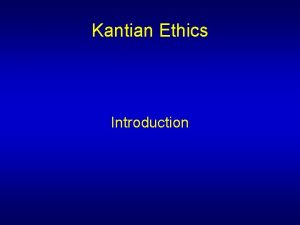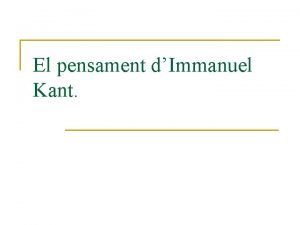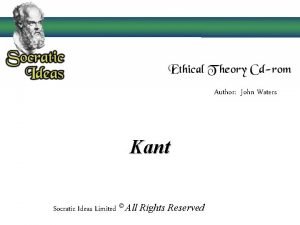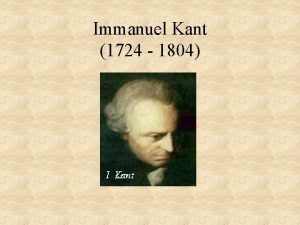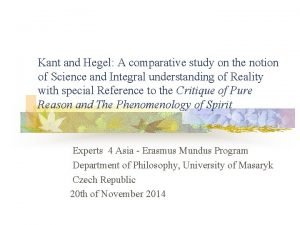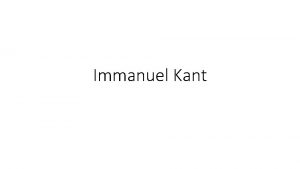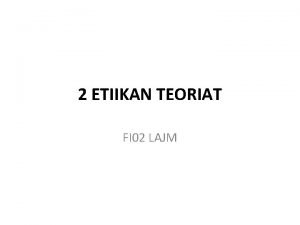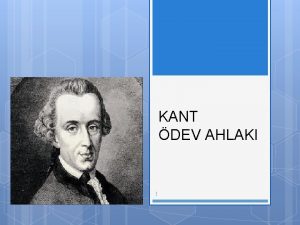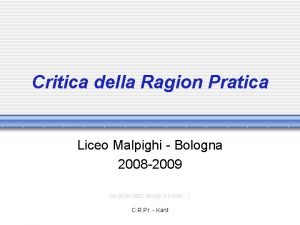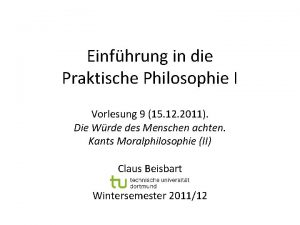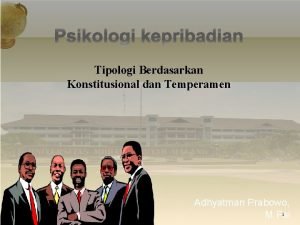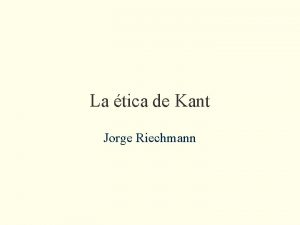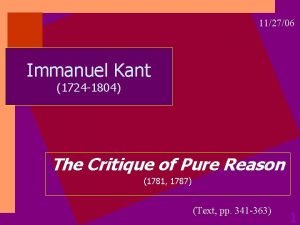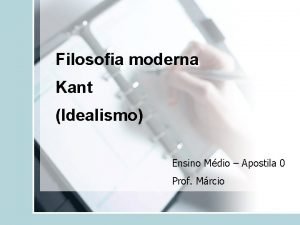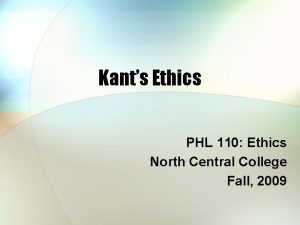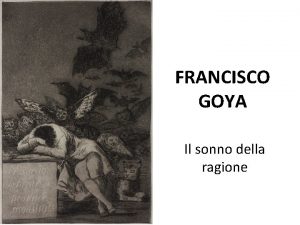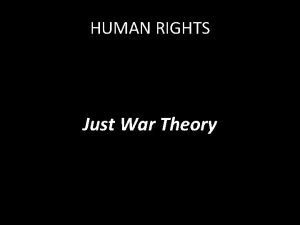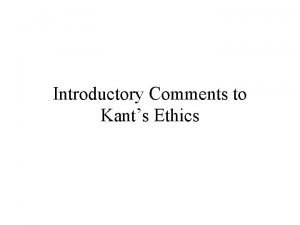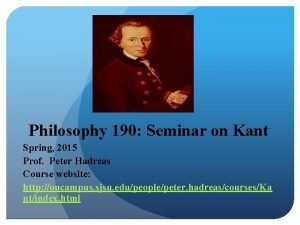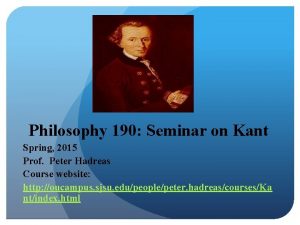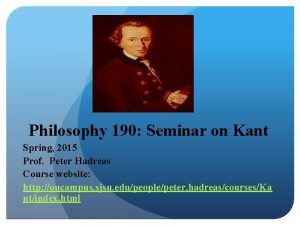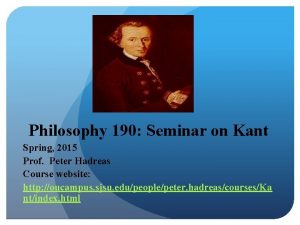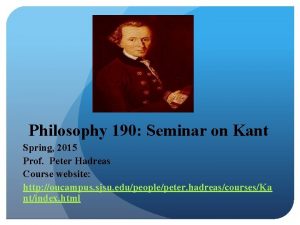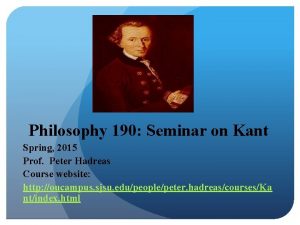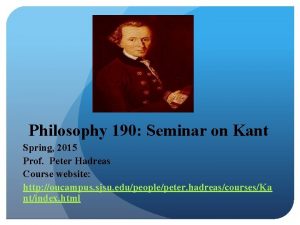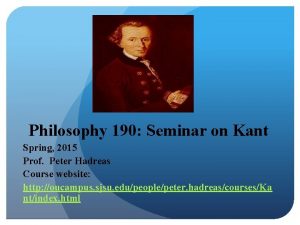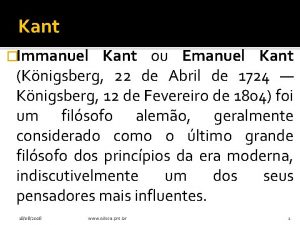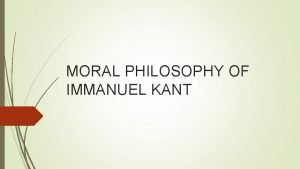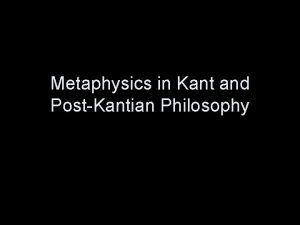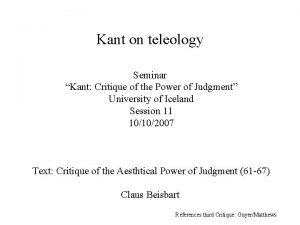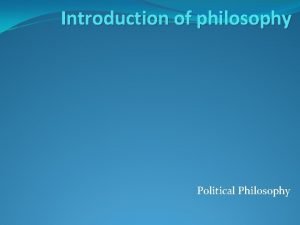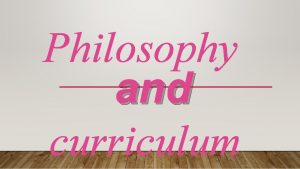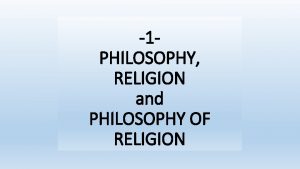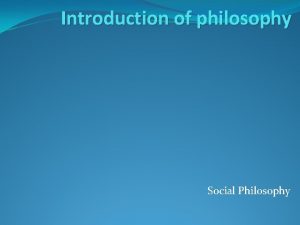Philosophy 190 Seminar on Kant Spring 2015 Prof

























































- Slides: 57

Philosophy 190: Seminar on Kant Spring, 2015 Prof. Peter Hadreas Course website: http: //oucampus. sjsu. edu/people/peter. hadreas/courses/Ka nt/index. html

“The Antinomy of Pure Reason, II, ” pp. 496 -550.

Critique of Pure Reason Prefaces Introduction Transcenden tal Doctrine of Elements First Part Trans. Aesthetic Transcenden tal Method Second Part Trans. Logic Division One: Trans. Analytic Book I: Analytic of Concepts Book II: Analytic of Principles Introduction Chapter 1: The Paralogisms of Pure Reason Division Two: Trans. Dialectic Book I: Concepts of Pure Reason Chapter II: The Antinomy of Pure Reason Book II: The dialectical inferences of pure reason Chapter III: the Ideal of Pure Reason

THE ANTINOMY OF PURE REASON Section 3, The Interest of Reason in these conflicts (pp. 496 -503) “Thus in determining the cosmological ideas of reason, the side of dogmatism or thesis exhibits: ” “First, a certain practical interest, in which every well-disposed person, once he understands its true advantage to him, heartily shares. That the world has a beginning, that my thinking self is of a simple and therefore incorruptible nature, that this self is likewise free and elevated above natural compulsion in its voluntary actions, and finally, that the whole order of things constituting the world descends from an original being, from which it borrows all its unity and purposive connectedness -these are so many cornerstones of morality and religion. The antithesis robs us of all these supports, or at least seems to rob us of them. ” (p. 498)

THE ANTINOMY OF PURE REASON Section 3, The Interest of Reason in these conflicts (pp. 496 -503) “Thus in determining the cosmological ideas of reason, the side of dogmatism or thesis exhibits: ” [copied from previous slide] “Second, a speculative interest of reason is expressed on this side too. For if one assumes and employs the transcendental ideas in such a way, then one can grasp the whole chain of conditions fully a priori and comprehend the derivation of the conditioned, starting with the unconditioned, which the antithesis cannot do; this gives it a bad recommendation, since it can give no answers to questions about the conditions of their synthesis that do not leave something out, and with its answers further questions without any end are always left over. . ”

THE ANTINOMY OF PURE REASON Section 3, The Interest of Reason in these conflicts (pp. 496 -503) “Thus in determining the cosmological ideas of reason, the side of dogmatism or thesis exhibits: ” [copied from previous slide] “Third, this side also has the merit of popularity, which certainly constitutes no small part of what recommends it. The common understanding does not find the least difficulty in the idea of an unconditioned beginning for every synthesis, since in any case it is more accustomed to descending to consequences than to ascending to grounds; and in the concept of something absolutely first (about whose possibility it does not bother itself) it finds both comfort and simultaneously a firm point to which it may attach the reins guiding its steps, since otherwise, always having one foot in the air, it can never take any delight in the restless climb from the conditioned to the condition. ”

THE ANTINOMY OF PURE REASON Section 3, The Interest of Reason in these conflicts (pp. 496 -503) “On the side of empiricism in determination of the cosmological ideas, or the antithesis, there is first, no such practical interest from pure principles of reason as morality and religion carry with them. Mere empiricism seems rather to take all power and influence away from both. If there is no original being different from the world, if the world is without a beginning and also without an author, if our will is not free and our soul is of the same divisibility and corruptibility as matter, then moral ideas and principles lose all validity, and they collapse along with the transcendental ideas that constitute their theoretical support. ”

THE ANTINOMY OF PURE REASON Section 3, The Interest of Reason in these conflicts (pp. 496503) [Reasons for maintaining antitheses] “On the contrary, however, empiricism offers advantages to the speculative interests of reason, which are very attractive and far surpass any that the dogmatic teacher of the ideas of reason might promise. For with empiricism the understanding is at every time on its own proper ground, namely the field solely of possible experiences, whose laws it traces, and by means of which it can endlessly extend its secure and comprehensible cognition. .

THE ANTINOMY OF PURE REASON Section 3, The Interest of Reason in these conflicts (pp. 496503) [Reasons for maintaining antitheses] [continued from previous slide]. . it is not even permitted to abandon its business, and, under the pretext that this has been brought to an end, to pass over into the territory of idealizing reason and transcendent concepts, where there is no further need to make observations and to inquire according to the laws of nature. . . ”

THE ANTINOMY OF PURE REASON Section 3, The Interest of Reason in these conflicts (pp. 496503) [Reasons for maintaining antitheses] “But if empiricism itself becomes dogmatic in regard to the ideas (as frequently happens), and boldly denies whatever lies beyond the sphere of its intuitive cognitions, then it itself makes the same mistake of immodesty, which is all the more blamable' here, because it causes an irreparable disadvantage to the practical interests of reason. This is the opposition of Epicureanism and Platonism. (p. 500 -1)

THE ANTINOMY OF PURE REASON Section 3, The Interest of Reason in these conflicts (pp. 496503) [Reasons for maintaining antitheses] “Each of the two [Epicureanism and Platonism] says more than it knows, but in such a way that the first encourages and furthers knowledge, though to the disadvantage of the practical, the second provides principles a which are indeed excellent for the practical, but in so doing allows reason, in regard to that of which only a speculative knowledge is granted us, to indulge in ideal explanations of natural appearances, and to neglect the physical investigation of them. ” (p. 501)

THE ANTINOMY OF PURE REASON Section 3, The Interest of Reason in these conflicts (pp. 496503) [Reasons for maintaining antitheses] “Finally, as to the third moment that can be seen in the provisional choice between the two conflicting parties, it is exceedingly strange that empiricism is completely contrary to everything popular, although one might have thought that the common understanding would eagerly take up a proposal promising to satisfy it through nothing but cognitions of experience and their rational connection, in place of transcendental dogmatism, which compels it to ascend to concepts far surpassing the insight and rational faculties even of those minds most practiced in thinking. But just this is its motive. For then it finds itself in a state in which even the most learned can take nothing away from it. ”

THE ANTINOMY OF PURE REASON Section 3, The Interest of Reason in these conflicts (pp. 496503) [Reasons for maintaining antitheses] [third. . . continued from previous slide] “If it [empiricism] understands little or nothing of these matters, neither can anyone else boast that they understand much more; and even if it cannot speak about them with as much scholastic correctness as others do, it can still ratiocinate infinitely more about them, because it is wandering among mere ideas, about which one can be at one's most eloquent just because one knows nothing about them; whereas regarding inquiries into nature, it would have to keep quiet and concede that it is ignorant. Comfort and vanity are therefore already a strong recommendation for these principles. . ” (p. 501 -2)

THE ANTINOMY OF PURE REASON Section 3, The Interest of Reason in these conflicts (pp. 496503) [The architectonic impulse of reason supports theses] “Human reason is by nature architectonic, i. e. , it considers all cognitions as belonging to a possible system, and hence it permits only such principles as at least do not render an intended cognition incapable of standing together with others in some system or other. But the propositions of the antithesis are of a kind that they do render the completion of an edifice of cognitions entirely impossible. According to them, beyond every state of the world there is another still older one; within every part there always still more that are divisible; . . .

THE ANTINOMY OF PURE REASON Section 3, The Interest of Reason in these conflicts (pp. 496503) [The architectonic impulse of reason supports theses] [continued from previous slide’ “before every occurrence there was always another which was in turn generated by others; and in existence in general everything is always only conditioned, and no unconditioned or first existence is to be recognized. Thus since the antithesis nowhere allows a first or a starting point that would serve absolutely as the foundation for its building, a completed edifice of cognition on such presuppositions is entirely impossible. Hence the architectonic interest of reason (which is demanded not by empirical unity but by pure rational unity) carries with it a natural recommendation for the assertions of thesis. ” (p. 502)

THE ANTINOMY OF PURE REASON, Fourth Section, The Transcendental Problems of Pure Reason, insofar as they absolutely must be capable of a solution. (pp. 503 -7) “It is not as extraordinary as it initially seems that a science can demand expect clear and certain solutions to all the questions belonging within it (quaestiones domesticae), even if up to this time they still have not been found. Besides transcendental philosophy, there are two pure sciences of reason, one with merely speculative, the other with practical content: pure mathematics and pure morals. Has it ever been proposed that because of our necessary ignorance of conditions it is uncertain exactly what relation, in rational or irrational numbers, the diameter of a circle bears to its circumference?

THE ANTINOMY OF PURE REASON, Fourth Section, The Transcendental Problems of Pure Reason, insofar as they absolutely must be capable of a solution. (pp. 503 -7) [continued from previous slide] “Since it cannot be given congruently to the former, but has not yet been found through the latter, it has been judged that at least the impossibility of such a solution can be known with certainty, and Lambert gave a proof of this. In the universal principles of ethics nothing can be uncertain, because the propositions are either totally nugatory and empty, or else they have to flow merely from our concepts of reason. On the other hand, in natural science there an infinity of conjectures in regard to which certainty can never be expected, because natural appearances are objects that are given to us independently of our concepts, . . . ” (p. 505)

NOTE on the ‘irrationality’ of π (pi) An irrational number is a real number that cannot be expressed as a fraction a/b, where a is an integer and b is a non-zero integer. In the 18 th century Johann Heinrich Lambert (1728 -1777), who Kant cites in CPR p. 505, A 480/B 508 proved that π is irrational. Lambert conjectured, but did not prove, also that e and π were both transcendental numbers. It was not until 1882, that Ferdinand von Lindemann proved that π is not just irrational, but transcendental as well. 1 1. Borwein, Peter B. , Pi, a source book (3 rd ed. ), New York: Springer-Verlag, pp. 194 – 225.

THE ANTINOMY OF PURE REASON, Fourth Section, The Transcendental Problems of Pure Reason, insofar as they absolutely must be capable of a solution. (pp. 503 -7) “The whole, in an empirical signification, is always only comparative. The absolute whole of magnitude (the worldwhole), of division, of descent, of the conditions of existence in general, together with all the questions about whether these are to come about through a finite or an endlessly continuing synthesis, has nothing to do with any possible experience. For example, you will not be able to explain the appearance of a body the least bit better, or even any differently, whether you assume that it consists of simple parts or completely of parts that are always composite; for no simple appearance can come before you, and neither can any infinite composition. . ” (p. 507)

THE ANTINOMY OF PURE REASON Section Five, Skeptical representation of the cosmological questions raised by all four transcendental ideas pp. 508 -10) “Accordingly, if I could antecedently see about a cosmological idea that whatever side of the unconditioned in the regressive synthesis of appearance it might come down on, it would be either too big or too small for every concept of the understanding, . . . ” (p. 508)

THE ANTINOMY OF PURE REASON Section Five, Skeptical representation of the cosmological questions raised by all four transcendental ideas pp. 508 -10) Summary of Application of ‘too big’ and ‘ too small’ to four antinomies. Quantity: no beginning [antithesis], too large for our concept; world has a beginning [thesis] too small. Quality: if division of parts is actually infinite [antithesis], then the regress in the division is too large; if parts are a simple or made of simples [thesis], then too small. Relation: If chain of causes goes on to infinity [antithesis], the regress is too large for our understanding; if some event(s) are produced freely, then the question ‘why’ produces an answer which is ‘too small. ’

THE ANTINOMY OF PURE REASON Section Five, Skeptical representation of the cosmological questions raised by all four transcendental ideas pp. 508 -10) Summary of Application of ‘too big’ and ‘ too small’ to four antinomies. Modality: If we admit an absolutely necessary being (which exists within the world) [thesis], we set it in a time infinitely remote from any given point of time, because otherwise it would be dependent upon another being, antecedent to it. Such an existence is ‘too big’ since it is unapproachable through any regress. But if we hold that everything belonging to the world is contingent [antithesis], any and every given existence is ‘too small’ for our concept. For we are constrained always still to look about for some other existence upon which it is dependent. ”

THE ANTINOMY OF PURE REASON Section Six: Transcendental idealism as the Key to solving the cosmological dialectic (pp. 511 -14) 1. "For since space is a form of intuition that we call outer, and without objects in it there would be no empirical representation at all, we can and must assume the extended beings in space as real; and it is precisely the same with time. Space itself, however, together with time, and with both, all appearances, are not things; but rather nothing but representations, and they cannot exist at all outside our mind (as an object of consciousness). . . ” (B 520/p. 511)

THE ANTINOMY OF PURE REASON Section Six: Transcendental idealism as the Key to solving the cosmological dialectic (pp. 511 -14) 2. "Accordingly, the objects of experience are never given in themselves, but only in experience, and they do not exist at all outside it. That there could be inhabitants of the moon, even though no human being has ever perceived them, must of course be admitted; but this only means only that in the possible progress of experience we could encounter them; . . . ” (A 493/p. 512)

THE ANTINOMY OF PURE REASON Section Six: Transcendental idealism as the Key to solving the cosmological dialectic (pp. 511 -14) 3. “. . . so that all those events which have elapsed from an inconceivable past time prior to my own existence signify nothing but the possibility of prolonging the chain of experience, starting with the present perception, upward to the condition that determine it in time. ” (A 495/p. 513)

THE ANTINOMY OF PURE REASON Section Seven: Critical decision of the cosmological conflict or reason with itself (A 497/B 525/pp. 443 -449) Point one: Fallacious shift from phenomenal to noumenal: “From this it is clear that the major premise of the cosmological syllogism takes the conditioned in the transcendental signification of a pure category, while the minor premise takes it in the empirical signification of a concept of the understanding applied to mere appearances; consequently there is present in it that dialectical deception that is called a sophisma figurae dictionis. This deception is, however, not artificial, but an entirely natural mistake of common reason.

THE ANTINOMY OF PURE REASON Section Seven: Critical decision of the cosmological conflict or reason with itself (A 497/B 525/pp. 514 -519) Point one: Fallacious shift from phenomenal to noumenal: “For through common reason, when something is given as conditioned, we presuppose (in the major premise) the conditions and their series as it were sight unseen, because this is nothing but the logical requirement of assuming complete premises for a given conclusion, and no time-order is present in the connection of the conditioned with its condition; both are presupposed as given simultaneously. (p. 516)

THE ANTINOMY OF PURE REASON Section Seven: Critical decision of the cosmological conflict or reason with itself (A 497/B 525/pp. 514 -519) Point two: The Confusion of contraries with contradictions. “If someone said that every body either smells good or sells not good, then there is a third possibility, namely that a body has no smell (aroma) at all, and thus both contradictions can be false. If I say that body is either good-smelling or not good-smelling (vel 1 suaveolens vel 1 non suaveolens), . . . ” (p. 517) [continues] 1. "vel" in Latin means opposites which are also contradictions.

THE ANTINOMY OF PURE REASON Section Seven: Critical decision of the cosmological conflict or reason with itself (A 497/B 525/pp. 514 -519) Point two: The Confusion of contraries with contradictions. [continued from previous slide] “then both judgments are contradictorily opposed, and the only the first is false, its contradictory opposite, namely, that some bodies are not goodsmelling, includes also those bodies that have no smell at all. In the previous opposition (per disparata), smell, the contingent condition of the concept of body (of smell) remained in the case of the conflicting judgment, and hence it was not ruled out by it; hence the latter judgment was not the contradictory opposite of the former. ” (p. 517)

THE ANTINOMY OF PURE REASON Section Seven: Critical decision of the cosmological conflict or reason with itself (A 497/B 525/pp. 514 -519) Point two: The Confusion of contraries with contradictions. “Accordingly, if I say that as regards space either the world is infinite or it is not infinite (non est infinitus), then if the first proposition is false, its contradictory opposite, ‘the world is not infinite, ’ must be true. Through it I would rule out only an infinite world, without positing another one, namely a finite one. But if it is said that the world is either infinite or finite (notinfinite), then both propositions could be false.

THE ANTINOMY OF PURE REASON Section Seven: Critical decision of the cosmological conflict or reason with itself (A 497/B 525/pp. 514 -519) Point two: The Confusion of contraries with contradictions. [continued from previous slide] “For then I regard the world as determined in itself regarding its magnitude, since in the opposition I not only rule out its infinitude, and with it, the whole separatea existence of the world, but I also add a determination of the world, as a thing active in itself, which might likewise be false, if, namely, the world were not given at all as a thing in itself, and hence, as regards its magnitude, neither as infinite nor as finite. Permit me to call such an opposition a dialectical opposition, but the contradictory one an analytical opposition.

THE ANTINOMY OF PURE REASON Section Seven: Critical decision of the cosmological conflict or reason with itself (A 497/B 525/pp. 514 -519) Point two: The Confusion of contraries with contradictions. [continued from previous slide] “Thus two judgments dialectically opposed to one another could both be false, because one does not merely contradict the other, but says something more than is required for a contradiction. ”

THE ANTINOMY OF PURE REASON Section Seven: Critical decision of the cosmological conflict or reason with itself (A 497/B 525/pp. 443 -449) Point two: The Confusion of contraries with contradictions. “What has been said here about the first cosmological idea, namely the absolute totality of magnitude in appearance, holds also for the others. The series of appearances is to be encountered only in the regressive synthesis itself, but is not encountered in itself in appearance, as a thing on its own given prior to every regress. Hence I will have to say: the multiplicity of parts in a given appearance is in itself neither finite nor infinite, because appearance is nothing existing in itself, and the parts are given for the very first time through the regress of the decomposing synthesis, and in this regress, which is never given absolutely wholly either as finite nor as infinite.

THE ANTINOMY OF PURE REASON Section Seven: Critical decision of the cosmological conflict or reason with itself (A 497/B 525/pp. 514 -519) Point two: The Confusion of contraries with contradictions. [continued from previous slide] “The very same holds of the series of causes ordered one above another, or of conditioned existence up to necessary existence, which can never be regarded in themselves as either finite or infinite in their totality, because, as series of subordinated representations, they exist only in the dynamical regress; but prior to this regress, and as a series of things subsisting for themselves, they cannot exist at all in themselves. ” (p. 518 -9)

THE ANTINOMY OF PURE REASON Section Eight. The regulative principle of pure reason in regard to the cosmological ideas. pp. 520 -4/A 508/B 536 “To this end, the first thing to do is to determine precisely the synthesis of a series insofar as it is never complete. With this aim one usually employs two expressions, which are supposed to draw a distinction, even though one does not know how to specify the ground of this distinction correctly. Mathematicians speak solely of a progressus in infinitum. But those who study concepts (philosophers) want, in place of this, to make the expression progressus in indefinitum the only valid one. Without stopping to examine the reservations to which this distinction has led, or to test whether their use has been good or fruitless, I will seek to determine these concepts precisely in relation to my own intentions. ” [continued on next slide]

THE ANTINOMY OF PURE REASON Section Eight. The regulative principle of pure reason in regard to the cosmological ideas. Pp. 520 -4/A 508/B 536 [continued from previous slide] “One can rightly say of a straight line that it could be extended to infinity, and here the distinction between the infinite and a progress of indeterminate length (progressus in indefinitum) would be an empty subtlety. For although when it is said, ‘Draw a line’ it obviously sounds more correct to add in indefinitum than if it were said in infinitum, because the first means a no more than ‘Extend it as far as you want, ’ but the second means ‘You ought never to stop extending it’ (which is not at all intended here); yet if we are talking only about what can be done, then the first expression is entirely correct, for you could always make it greater, to infinity.

THE ANTINOMY OF PURE REASON Section Eight. The regulative principle of pure reason in regard to the cosmological ideas. Pp. 520 -4/A 508/B 536 [continued from previous slide] “And this is also the situation in all cases where one is speaking only of a forward progress, i. e. , of a progress from the condition to the conditioned; this possible progress in the series of appearances goes to infinity. From one pair of parents you could progress in a descending line of generation without end, and you could also think that it might actually progress that way in the world. For here reason never needs an absolute totality in the series, because it is not presupposed as a condition as given (datum), but it is only added on as something conditioned, which is capable of being given (dabile), and this without end. ”

THE ANTINOMY OF PURE REASON Section Eight. The regulative principle of pure reason in regard to the cosmological ideas. Pp. 520 -4/A 508/B 536 [continued from previous slide] “It is entirely otherwise with the problem how far does the regress extend when it ascends from the given conditioned to its conditions in the series: whether I can say here that there is a regress to infinity or only a regress extending indeterminately far (in indefinitum), and whether from human beings now living I can ascend to infinity in the series of their ancestors, or whether it can be said only that as far as I have gone back, there has never been an empirical ground for holding the series to be bounded anywhere, so that for every forefather I am justified in seeking, and at the same time bound to seek, still further for his ancestors, though not to presuppose them? ”

THE ANTINOMY OF PURE REASON Section 9, pp. 524 -50. The Empirical Employment of the Regulative Principle of Reason, in Respect of all Cosmological Ideas “Thus the only thing left to us is the validity of the principle of reason as a rule for the continuation and magnitude of a possible experience, once its invalidity as a constitutive principle of appearances in themselves has been adequately demonstrated. If we can keep the former in view and beyond doubt, then the conflict of reason with itself will also be entirely at an end, since not only will the illusion that put reason at odds with itself have been done away with through its critical dissolution, but in place of it, that sense will have been uncovered in which reason agrees with itself, and whose misinterpretation was the sole cause of the conflict; and a principle that would otherwise be dialectical will be transformed into a doctrinal principle. ”

THE ANTINOMY OF PURE REASON Section 9, I. Resolution of the cosmological idea of the totality of the composition of the appearances of a world-whole. (pp. 525 -528) “From this follows at the same time the affirmative answer: The regress in the series of appearances in the world, as a determination of the magnitude of the world, goes on in indefinitum, which is as much as to say that the world of sense has no absolute magnitude, but the empirical regress (through which alone it can be given on the side of its conditions) has its rule, namely always to progress from each member of the series, as a conditioned, to a still more remote member (whether by means of one's own experience, or the guiding thread of history, or the chain of effects and their causes), and nowhere to exceed the extension of the possible empirical use of one's understanding, since this extension is the sole and proper business of reason in its principles.

THE ANTINOMY OF PURE REASON Section 9, II. Resolution of the cosmological idea of the totality of division of a given whole in intuition. (pp. 528 -530) “Thus only experience can settle how far the organization in an articulated body may go; and even if it was certain to attain to no inorganic parts, such parts must nevertheless at least lie within a possible experience. But how far the transcendental division of an appearance in general may reach is not a matter of experience at all, but it is rather a principle< of reason never to take the empirical regress in the composition of what is extended, in conformity with the nature of this appearance, to be absolutely complete.

THE ANTINOMY OF PURE REASON Section 9, II. Resolution of the cosmological idea of the totality of division of a given whole in intuition. (pp. 528 -530) “Thus only experience can settle how far the organization in an articulated body may go; and even if it was certain to attain to no inorganic parts, such parts must nevertheless at least lie within a possible experience. But how far the transcendental division of an appearance in general may reach is not a matter of experience at all, but it is rather a principle< of reason never to take the empirical regress in the composition of what is extended, in conformity with the nature of this appearance, to be absolutely complete. ” (p. 530)

THE ANTINOMY OF PURE REASON III. Resolution of the cosmological idea of the totality of the derivation of occurrences in the world from their causes. (pp. 532 -546) It is especially noteworthy that it is this transcendental idea of freedom on which the practical concept of freedom is grounded, and the former constitutes the real moment of the difficulties in the latter, which have long surrounded the question of its possibility. Freedom in the practical sense is the independence of the power of choice from necessitation by impulses of sensibility. For a power of choice is sensible insofar as it is pathologically affected (through moving-causes of sensibility); it is called an animal power of choice (arbitrium brutum) if it can be pathologically necessitated.

THE ANTINOMY OF PURE REASON III. Resolution of the cosmological idea of the totality of the derivation of occurrences in the world from their causes. (pp. 532 -546) “The human power of choice is indeed an arbitrium sensitivum, yet not brutum but liberum, because sensibility does not render its action necessary, but in the human being there is a faculty of determining oneself from oneself, independently of necessitation by sensible impulses. ” 1 1. NOTE: The distinction between the types of of choice demonstrates the strong influence Alexander Baumgarten (1714 – 1762) had on Kant. For many years, Kant used Baumgarten's Metaphysics as a handbook or manual for his lectures on that topic. Gary Banham, Dennis Schulting, Nigel Hems indicate Baumgarten’s views on freedom in their The Bloomsbury Companion to Kant: According to Baumgarten: “There are two kinds of arbitrium: (1) arbitrium sensitivum and (2) liberum arbitrium. The difference between the two conceptions of arbitrium consists in the different kinds of desire that determine actions. In cases where the inner desire is sensible, arbitrium is sensitium, while in cases where it is rational, the arbitrium is liberum. Only in the latter sense, according to Baumgarten, is it possible to talk of libertas or libertas moralis proper. ” The Bloomsbury Companion to Kant (London/New York:

THE ANTINOMY OF PURE REASON III. Resolution of the cosmological idea of the totality of the derivation of occurrences in the world from their causes. (pp. 532 -546) “I call intelligible that in an object of sense which is not itself appearance. Accordingly, if that which must be regarded as appearance in the world of sense has in itself a faculty which is not an object of intuition through which it can be the cause of appearances, then one can consider the causality of this being in two aspects, as intelligible in its action as a thing in itself, and as sensible in the effects of that action as an appearance in the world of sense. Of the faculty of such a subject we would accordingly form an empirical and at the same time an intellectual concept of its causality, both of which apply to one and the same effect. Think-

THE ANTINOMY OF PURE REASON III. Resolution of the cosmological idea of the totality of the derivation of occurrences in the world from their causes. (pp. 532 -546) “I call intelligible that in an object of sense which is not itself appearance. Accordingly, if that which must be regarded as appearance in the world of sense has in itself a faculty which is not an object of intuition through which it can be the cause of appearances, then one can consider the causality of this being in two aspects, as intelligible in its action as a thing in itself, and as sensible in the effects of that action as an appearance in the world of sense. Of the faculty of such a subject we would accordingly form an empirical and at the same time an intellectual concept of its causality, both of which apply to one and the same effect. Thinking of the faculty [continued]

THE ANTINOMY OF PURE REASON III. Resolution of the cosmological idea of the totality of the derivation of occurrences in the world from their causes. (pp. 532 -546) “of an object of sense in this double aspect does not contradict any of the concepts we have to form of appearances and of a possible experience. For since these appearances, because they are not things in themselves, must be grounded in a transcendental object determining them as mere representations, nothing hinders us from ascribing to this transcendental object, apart from the property through which it appears, also another causality that is not appearance, even though its effect is encountered in appearance.

THE ANTINOMY OF PURE REASON III. Resolution of the cosmological idea of the totality of the derivation of occurrences in the world from their causes. (pp. 532 -546) [continued from previous slide] “But every effective cause must have a character, i. e. , a law of its causality, without which it would not be a cause at all. And then for a subject of the world of sense we would have first an empirical character, through which its actions, as appearances, would stand through in connection with other appearances in accordance with constant natural laws, from which, as their conditions, they could be derived; and thus, in combination with these other appearances, they would constitute members of a single series of the natural order.

THE ANTINOMY OF PURE REASON III. Resolution of the cosmological idea of the totality of the derivation of occurrences in the world from their causes. (pp. 532 -546) [continued from previous slide] “Yet second, one would also have to allow this subject an intelligible character, through which it is indeed the cause of those actions as appearances, but which does not stand under any conditions of sensibility and is not itself appearance. The first one could call the character of such a thing in appearance, the second its character as a thing in itself. ” (p. 536)

THE ANTINOMY OF PURE REASON III. Resolution of the cosmological idea of the totality of the derivation of occurrences in the world from their causes. (pp. 532 -546) “But in its intelligible character (even though we can have nothing more than merely the general concept of it), this subject would nevertheless have to be declared free of all influences of sensibility and determination by appearances; and since, in it, insofar as it is a noumenon, nothing happens, thus no alteration requiring a dynamical time-determination is demanded, and hence no connection with appearances as causes is encountered in its actions, this active being would to this extent be independent and free of all the natural necessity present solely in the world of sense. ” (p. 537)

THE ANTINOMY OF PURE REASON III. Resolution of the cosmological idea of the totality of the derivation of occurrences in the world from their causes. (pp. 532 -546) [continued] from previous slide] “Of it one would say quite correctly that it begins its effects in the sensible world from itself, without its action beginning in it itself; and this would hold without allowing effects in the world of sense to begin from themselves, because in this world they are always determined beforehand by empirical conditions in the preceding time, but only by means of the empirical character (which is a mere appearance of the intelligible character), and they are possible only as a continuation of the series of natural causes. Thus freedom and nature, each in its full significance, would both be found in the same actions, simultaneously and without any contradiction, according to whether one compares them with their intelligible or their sensible cause. ” (p. 537)

THE ANTINOMY OF PURE REASON III. Resolution of the cosmological idea of the totality of the derivation of occurrences in the world from their causes. (pp. 532 -546) “In order to clarify the regulative principle of reason through an example of its empirical use -not in order to confirm it (for such proofs are unworkable for transcendental propositions) -one may take a voluntary action, e. g. a malicious lie, through which a person b has brought about a certain confusion in society; and one may first investigate its moving causes, through which it arose, judging on that basis how the lie and its consequences could bee imputed to the person. With this first intent one goes into the sources of the person's empirical character, seeking them in a bad upbringing, bad company, and also finding them in the wickedness of a natural temper insensitive to shame, partly in carelessness and thoughtlessness; in so doing one does not leave out of account the occasioning causes.

THE ANTINOMY OF PURE REASON III. Resolution of the cosmological idea of the totality of the derivation of occurrences in the world from their causes. (pp. 532 -546) [continued from previous slide] “In all this one proceeds as with any investigation in the series of determining causes for a given natural effect. Now even if one believes the action to be determined by these causes, one nonetheless blames the agent, and not on account of his unhappy natural temper, not on account of the circumstances influencing him, not even on account of the life he has led previously; for one presupposes that it can be entirely set aside how that life was constituted, and that the series of conditions that transpired might not have been, but rather that this deed could be regarded as entirely unconditioned in regard to the previous state, as though with that act the agent had started a series of consequences entirely from himself.

THE ANTINOMY OF PURE REASON III. Resolution of the cosmological idea of the totality of the derivation of occurrences in the world from their causes. (pp. 532 -546) [continued from previous slide] “This blame is grounded on the law of reason, which regards reason as a cause that, regardless of all the empirical conditions just named, could have and ought to have determined the conduct of the person to be other than it is. And indeed one regards the causality of reason not as a mere concurrence with other causes, e but as complete in itself, even if sensuous incentives were not for it but were indeed entirely against it; the action is ascribed to the agent's intelligible character: now, in the moment when he lies, it is entirely his fault; hence reason, regardless of all empirical conditions of the deed, is fully free, and this deed is to be attributed entirely to its failure to act. ” (p. 544)

THE ANTINOMY OF PURE REASON IV: Solution of the cosmological idea of the totality of dependence of appearances regarding their existence in general. (pp. 546 -549) “But here it is not at all the intent to prove the unconditionally necessary existence of any being, or even to ground the possibility of a merely intelligible condition of existence in the world of sense on it; rather, just as we limit reason so that it does not abandon the thread of the empirical conditions, and stray into transcendent grounds of explanation which do not admit of any exhibition in concreto, so on the other side we limit the law of the merely empirical use of the understanding, so that it does not decide the possibility of things in general, nor declare the intelligible, even though it is not to be used by us in explaining appearances, to be impossible. [continues]

THE ANTINOMY OF PURE REASON IV: Solution of the cosmological idea of the totality of dependence of appearances regarding their existence in general. (pp. 546 -549) “Thus it has been shown only that the thoroughgoing contingency of all natural things and all of nature's (empirical) conditions can very well coexist with the optional presupposition of a necessary, even though merely intelligible condition, and thus that there is no true contradiction between these assertions, hence they can both be true. Such an absolutely necessary being of the understanding may always be impossible in itself, yet this can by no means be inferred from the universal contingency and dependence of everything belonging to the world of sense, nor can it be inferred from the principle' that we should not stop with any individual member of it and appeal to a cause outside the world. Reason goes its way in its empirical use, and a special way in a transcendental use. ” (p. 548)

Slides #1 seriatim, Portrait of Immanuel Kant in mid-life: http: //www. lancaster. ac. uk/users/philosophy/courses/100/Kant 003. jpg
 Kant philosophy
Kant philosophy Kantian ethics vs utilitarianism
Kantian ethics vs utilitarianism Kant principles
Kant principles Spring break 2015
Spring break 2015 Spring autumn fall
Spring autumn fall Spring, summer, fall, winter... and spring cast
Spring, summer, fall, winter... and spring cast Doti
Doti Adva 190
Adva 190 Cnm 190
Cnm 190 190 vauxhall bridge road mental health
190 vauxhall bridge road mental health Lion poids 190 kg
Lion poids 190 kg 3650/2470
3650/2470 S = bilangan asli dan b = x 1 x
S = bilangan asli dan b = x 1 x 10 % de 190 755 799
10 % de 190 755 799 190 words
190 words Telescience museum
Telescience museum Betreiberverantwortung gefma 190
Betreiberverantwortung gefma 190 Me 190 sjsu
Me 190 sjsu Vertical
Vertical Ar 190-45
Ar 190-45 Cogsci 190
Cogsci 190 Rimski brojevi
Rimski brojevi Cse 190
Cse 190 Norse goddesses of love
Norse goddesses of love Hegel sunglasses
Hegel sunglasses Idealismo trascendental de immanuel kant
Idealismo trascendental de immanuel kant Kant epistemology
Kant epistemology Noumeno kant
Noumeno kant Spazio e tempo kant
Spazio e tempo kant Kantian morality
Kantian morality Imperatiu hipotetic
Imperatiu hipotetic The kantian triangle
The kantian triangle Giudizi sintetici a priori
Giudizi sintetici a priori Kant law
Kant law Kant third critique
Kant third critique Kant
Kant ética kantiana características
ética kantiana características Anti utilitarian
Anti utilitarian Hegel vs kant
Hegel vs kant Categorical imperative ethics
Categorical imperative ethics Kant schema riassuntivo
Kant schema riassuntivo Sopimusetiikka
Sopimusetiikka Immanuel kant human rights
Immanuel kant human rights Kant bakkal örneği
Kant bakkal örneği Liceo immanuel kant
Liceo immanuel kant Kant universalisierungsformel
Kant universalisierungsformel Tipologi psikologi kepribadian
Tipologi psikologi kepribadian Etica kantiana
Etica kantiana Imperativo categorico kant
Imperativo categorico kant Ideas kant
Ideas kant Teori kant laplace
Teori kant laplace Idealismo kant
Idealismo kant Kant theory
Kant theory Goya chiaroscuro
Goya chiaroscuro I 3 postulati di kant
I 3 postulati di kant Immanuel kant human rights
Immanuel kant human rights As discussed
As discussed Kant vita
Kant vita
